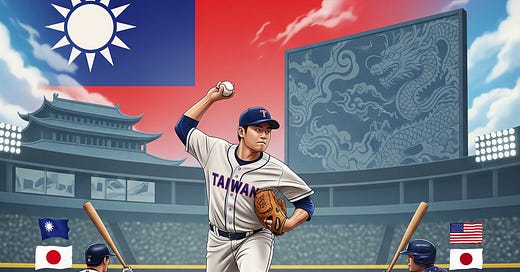In Taiwan, Baseball is a serious thing
How can this sport help us understand the complex history of this country
April 12, 2020. A paralysis has gripped the globe, brought on by an enemy invisible to the human eye. For months, a word once confined to history books had become a stark, daily reality: quarantine.
It began in China, then swept through Asia, Europe, and, piece by piece, the entire planet—the world ground to a halt. People were sealed in their homes. Schools and offices were shuttered. Shops closed their doors, and all sports and entertainment vanished with them. As the number of infections climbed, so did the death toll. It felt as if there was no light at the end of the tunnel.
But then, on that April day, the first sliver of unexpected good news broke through the gloom. In Taiwan, the Chinese Professional Baseball League returned to the field. The stadiums were empty, but it was the first tentative signal of a return to normalcy—and a potent message of hope to the rest of the world.
The news was broadcast by major international media like the BBC, CNN, and ESPN, who hailed the remarkable event and Taiwan's capacity to contain the virus. The images of players in action, even in the eerie silence of fanless stands, offered a flicker of hope and a taste of the ordinary to millions of sports enthusiasts worldwide.
This swift restart was the fruit of a proactive and successful strategy of contact tracing and infection containment, a testament to the effectiveness of the Taiwanese healthcare system.
That baseball was the sport chosen for this "premiere" was no accident. Baseball is Taiwan's most beloved sport, the one that most deeply mirrors its people. It is through baseball that one can begin to comprehend the complex and sophisticated history of both the island and its inhabitants.
In recent years, the name Taiwan has appeared with growing frequency in global headlines—for its microchips, for China’s declared ambition to invade, and for its ominous label as the most dangerous place on Earth, a potential flashpoint for a third world war.
But why is China so fixated on Taiwan?
Is it conceivable that a war between the United States and China could truly erupt over this small island?
And most importantly, what does baseball have to do with any of this?
The Rebel Island
Taiwan's situation is extraordinarily complex. The island lies just 150 kilometers off the coast of China, separated from the mainland only by the Formosa Strait. Beijing considers it a part of its territory—its "rebel province"—refusing to recognize its independence and escalating its demands for control, threatening reunification by force.
Officially named the Republic of China, the island is recognized by only a handful of countries. Though Beijing claims it as its own, Taipei operates as a proud and independent entity. To grasp how this reality came to be, we must journey back through the country's layered history.
Our story begins in the 13th century, when the first Han fishermen settled in Taiwan, vying for territory with Japanese and Korean arrivals. The island was later charted by the Portuguese, who christened it Ilha Formosa—the "Beautiful Island."
In the 17th century, Dutch merchants established commercial outposts, soon followed by the Spanish. Both European powers were primarily focused on trade and spreading Christianity. It was the Dutch who gave it the name Taiwan. By the end of the century, however, the Europeans were expelled by the Qing dynasty, triggering a massive wave of Han migration to the island.
The Qing dynasty ruled Taiwan for two centuries until its defeat by Japan in 1895, a loss that resulted in the island's cession to the Japanese. This moment inaugurated a half-century of Japanese rule that would leave a decisive and permanent imprint on the island and its people.
The Japanese immediately moved to eliminate three iconic practices of Chinese culture: the binding of women's feet; the consumption of opium; and the Manchu hairstyle of a shaved forehead with a long, plaited queue. The Manchu were the last imperial dynasty of China, a story splendidly told in the film The Last Emperor. The unique hairstyle was a defining feature of their identity.
Over time, the Japanese enacted a thorough assimilation process that included the entire population, even the indigenous peoples. During World War II, thousands enlisted and fought under the Japanese flag. Have you ever heard the story of the Japanese soldier discovered on the island of Morotai in 1974, still armed and convinced the war was not over? His name was Teruo Nakamura, and he was an indigenous Taiwanese.
Japan governed the island for fifty years, imposing an accelerated modernization that brought infrastructure, a modern education system, and the promotion of sports as a tool for discipline and nationalism. It was within this context that baseball, wildly popular in Japan, was introduced to Taiwan, where it took deep and lasting root.
Schools and factories formed their teams, and the game became a symbol of progress, offering the Taiwanese a chance to prove their prowess. This period of Japanese domination left an indelible mark on Taiwanese culture, and baseball stands as one of its most vivid and enduring legacies—a bridge connecting a colonial past to a contemporary identity.
Much More Than a Sport
In the West, we are accustomed to a passionate love for sports like football and basketball. It’s hard to imagine any sport being cherished more intensely. But Taiwan's relationship with baseball transcends mere fandom.
To understand it, we must witness a specific moment. It is March 25, 2000. Chen Shui-bian makes his first public appearance as Taiwan's newly elected president, not in a government building, but at the opening game of the Taiwan Major League.
Keep reading with a 7-day free trial
Subscribe to Sports & Geopolitics to keep reading this post and get 7 days of free access to the full post archives.




